Blue envelope program offered for Massachusetts drivers on autism spectrum
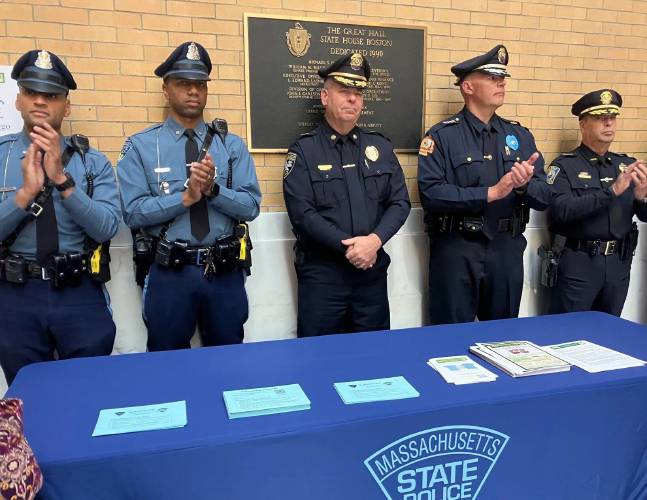
Massachusetts State Police showcase their new blue envelopes, designed to improve interactions with drivers on the autism spectrum, during an event hosted by Advocates for Autism of Massachusetts on Tuesday. STATE HOUSE NEWS SERVICE/ALISON KUZNITZ
| Published: 04-10-2024 4:08 PM |
BOSTON — Massachusetts State Police have begun implementing a program to improve interactions with people on the autism spectrum, building upon legislation that won Senate approval in January and remains before a House committee.
Participating drivers can choose to place copies of their license, registration and insurance cards inside a blue envelope, which acts as a visual cue for police and other public safety officials during stressful and potentially dangerous traffic stops.
The envelope would notify police that the driver is on the spectrum and provide guidance for how to handle certain behaviors. Drivers can also share emergency contact information on the envelope.
Lt. Gov. Kim Driscoll touted the initiative, which State Police developed with the Massachusetts Chiefs of Police Association and advocacy groups, during an event hosted by the Advocates for Autism of Massachusetts organization on Tuesday.
“This is an initiative that reflects our administration’s deep commitment to support programs that strengthen inclusivity and support law enforcement’s ability to more effectively meet the needs of every single community member,” Driscoll said.
The Senate in early January passed legislation to also create a voluntary blue envelope program, directing the envelopes to be made available at Registry of Motor Vehicle offices. The bill, filed by Sen. Jo Comerford, D-Northampton, and now in the House Ways and Means Committee, did not carve out a specific responsibility for State Police to use the envelopes, Comerford aides said.
In recognition of her support of the disability community and her work to file and pass the bill in the Senate, Comerford was honored by the Advocates for Autism of Massachusetts, receiving the 2024 Distinguished Legislator of the Year Award.
With the bill’s fate in the House unclear, however, law enforcement and advocates have moved forward with their own program, which the Healey administration announced Tuesday as it marked Autism Acceptance Month in April. Massachusetts State Police implemented the initiative “with the cooperation of Sen. Comerford,” spokesperson David Procopio said.
Article continues after...
Yesterday's Most Read Articles
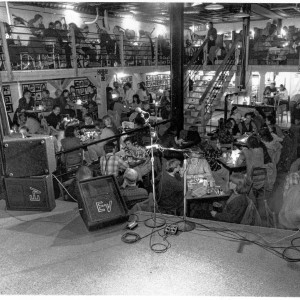 The Iron Horse rides again: The storied Northampton club will reopen at last, May 15
The Iron Horse rides again: The storied Northampton club will reopen at last, May 15
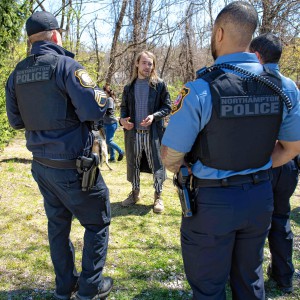 Homeless camp in Northampton ordered to disperse
Homeless camp in Northampton ordered to disperse
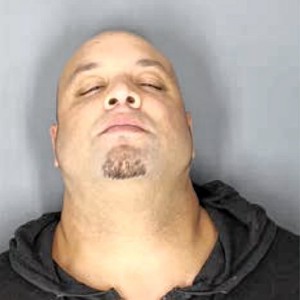 Authorities ID victim in Greenfield slaying
Authorities ID victim in Greenfield slaying
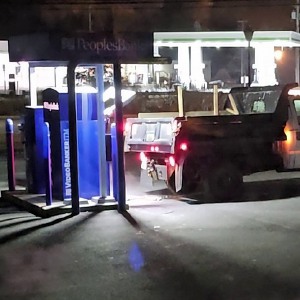 $100,000 theft: Granby Police seek help in ID’ing 3 who used dump truck to steal cash from ATM
$100,000 theft: Granby Police seek help in ID’ing 3 who used dump truck to steal cash from ATM
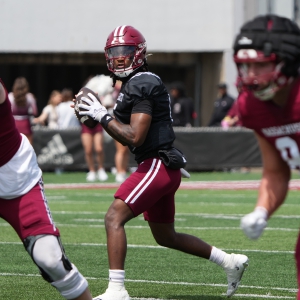 UMass football: Spring Game closes one chapter for Minutemen, 2024 season fast approaching
UMass football: Spring Game closes one chapter for Minutemen, 2024 season fast approaching
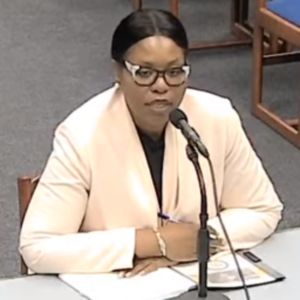 Final pick for Amherst regional superintendent, from Virgin Islands, aims to ‘lead with love’
Final pick for Amherst regional superintendent, from Virgin Islands, aims to ‘lead with love’
Autism advocates warn that police, without training, can misinterpret the behavior of individuals on the spectrum — such as hand flapping, body rocking or repeating certain phrases — and use force when it could have been avoided.
“It is incumbent upon us, as law enforcement officers and compassionate community caretakers, to recognize and mitigate the stressful effects that interaction with a police officer can have on a person with autism,” Col. John Mawn Jr., interim superintendent of the State Police, said in a statement. “The Blue Envelope Program is an important step toward that goal.”
State Police are rolling out the blue envelopes to their barracks and working to share information with municipal police departments in the coming days, said Agawam Police Chief Eric Gillis, president of the Massachusetts Chiefs of Police Association.
In Greenfield, the envelopes were made available at the city’s dispatch center on Tuesday. Police Chief Todd Dodge said the program will make routine traffic stops safer and more comfortable for both drivers with autism and police officers.
“It’s safety for both sides,” Dodge said. “When we have an opportunity to learn and understand people better, we need to do that. If we’re going to interact with these members of our community, we need to do it right. … There’s always apprehension on the part of officers who approach vehicles with people in them that they don’t know. If someone acts outside of the norm, they’d like to know why, and these blue envelopes will explain why, so that officers can tailor their approach.”
Dodge added he would like to see similar educational programs emerge in the future to facilitate safe interactions between officers and drivers of other demographics, such as those who don’t speak English or the hard of hearing.
Statewide, people on the spectrum can request the envelopes at a State Police barracks or online. The envelopes are free, and people can get multiple envelopes if they have more than one vehicle.
“Our officers receive training in dealing with persons with autism and the different communication styles that are necessary for those interactions,” Gillis said. “But to open the conduit right out of the gate with the blue envelopes lets our officers know across the commonwealth who’re they dealing with, and that they need to kind of shift gears a little bit when dealing with that type of individual.”
Gillis added, “This is something we’ve been behind for a long, long time, and it’s just nice to see it come to fruition.”
The blue envelopes, which contain written instructions for police officers and drivers on the autism spectrum, were available at Tuesday’s event.
For police officers, the envelope states the driver “may display repetitive body movements or fidgeting and may have unusual eye contact” and “may exhibit signs of high anxiety especially due to bright lights and noises such as your radio.”
Police are asked to “allow driver extra time to respond to your questions; they may have difficulty interpreting and processing your directions”; “use the most simplistic explanations possible, speak clearly, and limit unnecessary details or jargon”; “clearly tell the driver when the stop is over and that they may leave”; and “if the driver becomes upset, ask and/or consider contacting the person listed on the reverse of this envelope.”
Drivers are given instructions that tell them to keep their hands on the steering wheel until they are told otherwise by police, provide the blue envelope to the officer and ask the officer to consider calling their emergency contact. Drivers are warned “the officer may shine a flashlight in your car, may have a loud radio and may have flashing lights on their car.”
State officials recommend attaching the envelopes to the car’s sun visor or placing them in another accessible location.
The envelopes also contain QR codes, which out-of-state law enforcement can scan if they are unfamiliar with the program.
Greenfield Recorder Staff Writer Anthony Cammalleri contributed to this article.

 Authorities ID victim in Greenfield slaying
Authorities ID victim in Greenfield slaying  Federal probe targets UMass response to anti-Arab incidents
Federal probe targets UMass response to anti-Arab incidents Locking up carbon for good: Easthampton inventor’s CO2 removal system turns biomass into biochar
Locking up carbon for good: Easthampton inventor’s CO2 removal system turns biomass into biochar William Strickland, a longtime civil rights activist, scholar and friend of Malcolm X, has died
William Strickland, a longtime civil rights activist, scholar and friend of Malcolm X, has died
